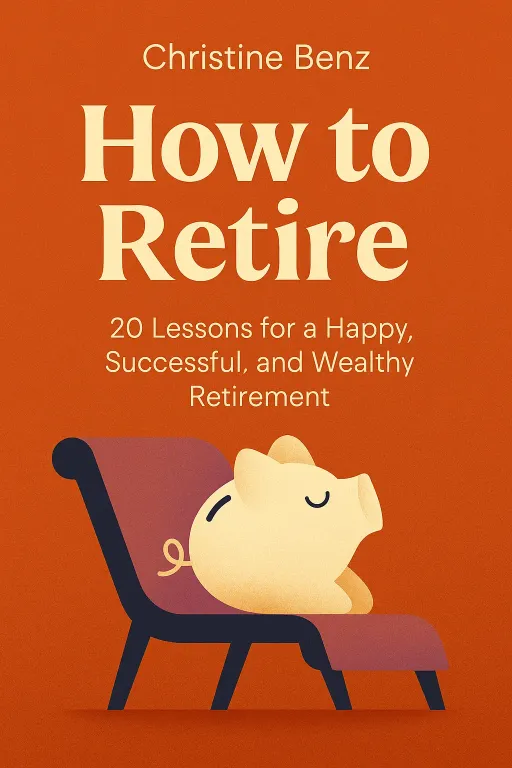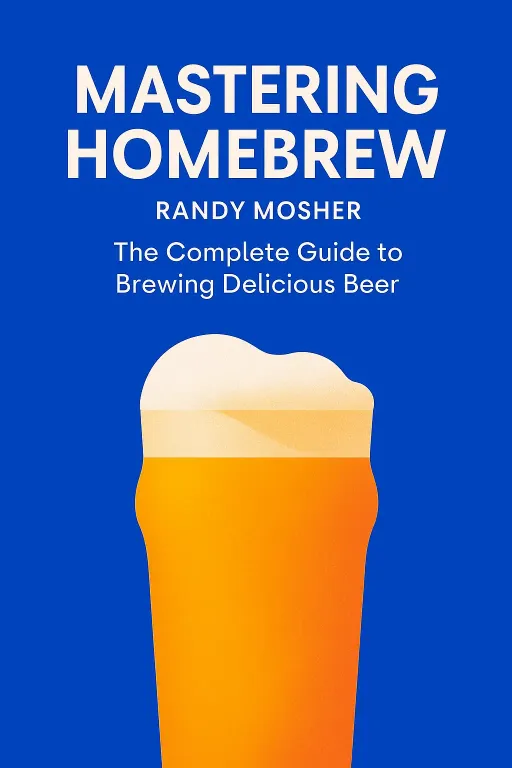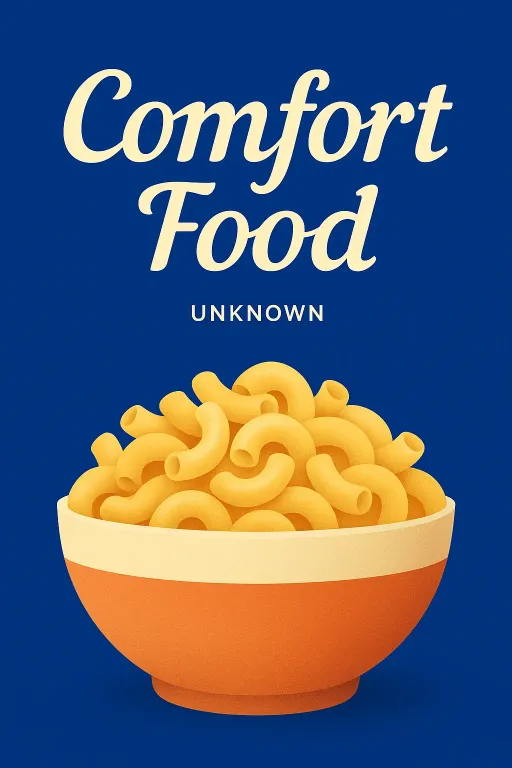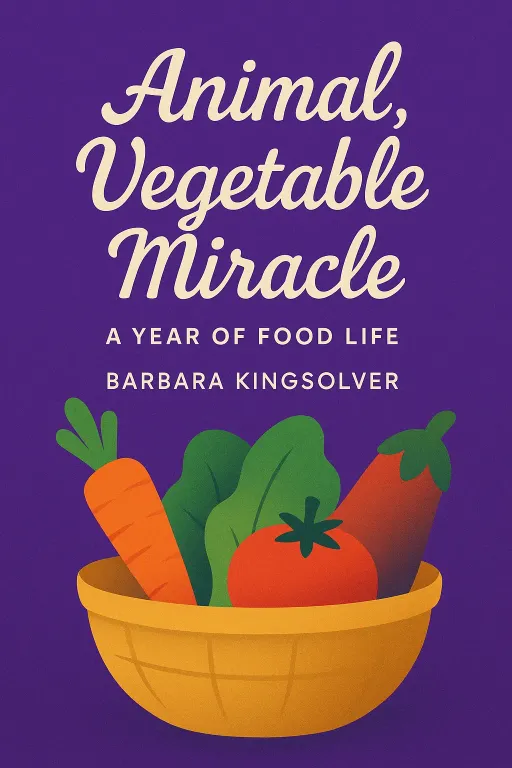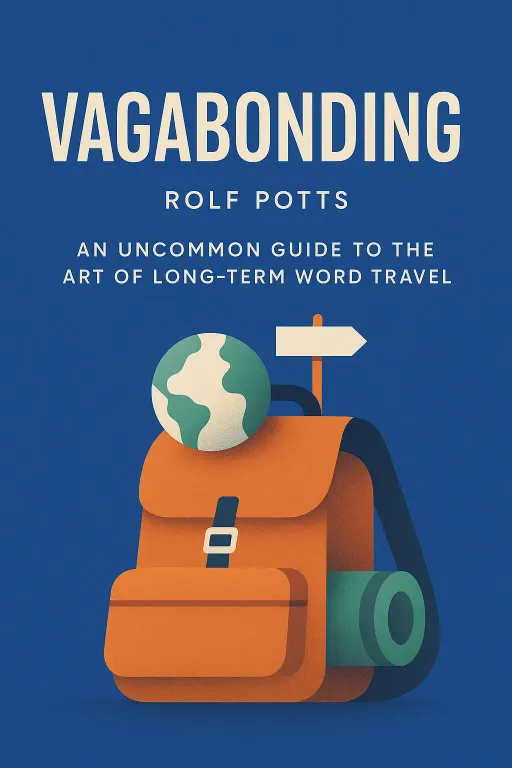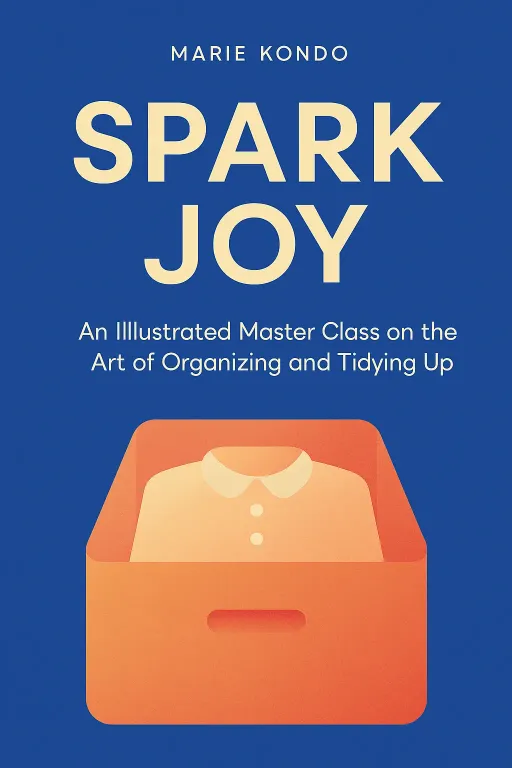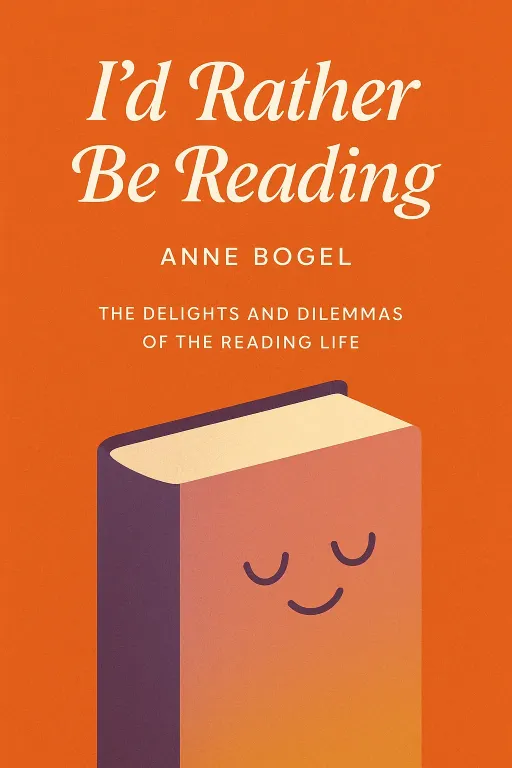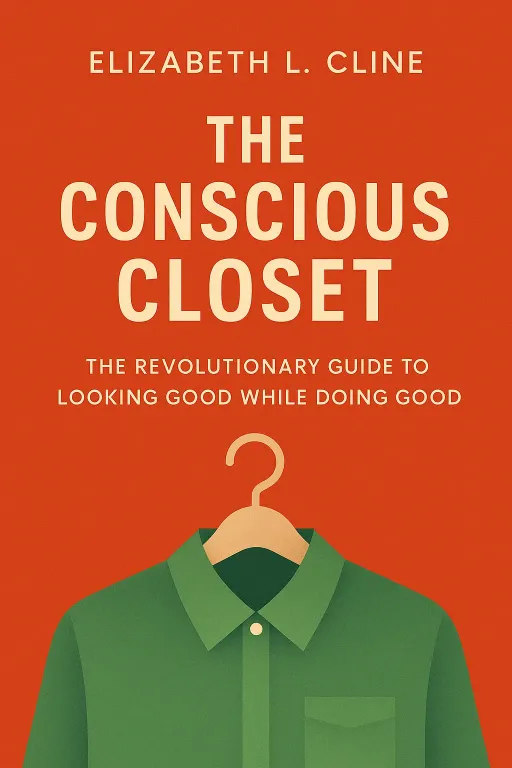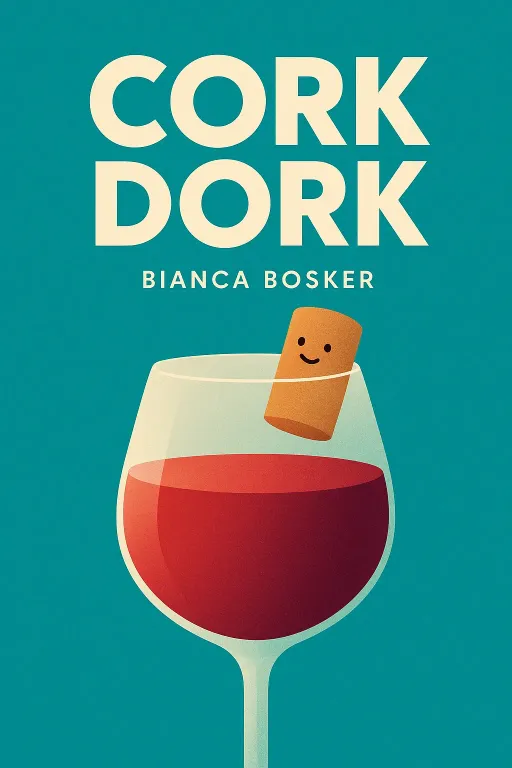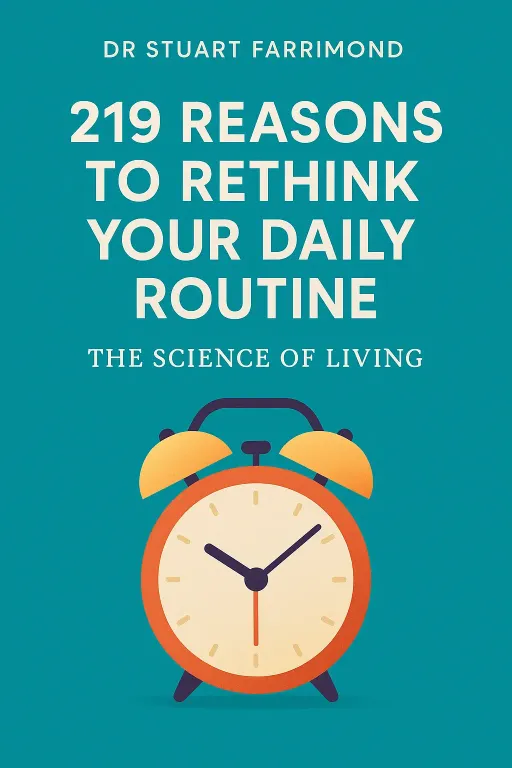
The Morning Battleground
13 min219 Reasons to Rethink Your Daily Routine
Golden Hook & Introduction
SECTION
Rachel: Alright, Justine. On a scale of 1 to 'sentient slug,' how functional are you before your first coffee? Justine: Let's just say my brain's operating system is still loading, and the progress bar has been stuck at 12% for the last half hour. Don't talk to me about function. Rachel: That is a perfect description. That feeling of being a sentient slug is exactly what we’re dissecting today, through the lens of Dr. Stuart Farrimond’s book, The Science of Living: 219 Reasons to Rethink Your Daily Routine. Justine: Oh, I like the sound of that. I could use about 219 reasons to rethink my entire morning. Rachel: Well, the author's perspective is what makes this book so compelling. Dr. Farrimond was a practicing medical doctor, but he had to leave his clinical work after a brain tumor diagnosis led to epilepsy and chronic fatigue. Justine: Wow, that's heavy. So he’s not just a scientist in a lab; he’s lived through serious health challenges. Rachel: Exactly. That experience completely reshaped his view on health, pushing him to communicate science in a way that helps us all rethink our most basic daily habits. He’s not just telling us what to do; he’s exploring the 'why' from a place of deep personal understanding. And while the book got a generally positive reception for being so accessible, some readers found it almost too broad. But for our purposes, it’s a goldmine. Justine: I can see that. It makes the advice feel more urgent, more human. Okay, so Dr. Farrimond, please, tell me why my brain feels like a dial-up modem every single morning.
The Morning Battleground: Why Waking Up is a Biological War
SECTION
Rachel: I’m so glad you asked. The book gives this feeling a name: "sleep inertia." It's a very real biological state. When you're jolted awake, especially from deep sleep, the thinking parts of your brain—the frontal lobes—are basically still offline. They are straining to shift into gear. Justine: Straining is the right word. It feels like I’m trying to do calculus with a wet sponge. Rachel: That’s not far off! The book cites research showing the effects are staggering. In that state of sleep inertia, your reaction times can be 360% slower. Your ability to process information is down by 70%, and your capacity to make good decisions is 51% worse. Justine: Hold on. Fifty-one percent worse? That explains so many of my early morning fashion choices. And it also explains why the first decision I make is always the worst one. Rachel: Let me guess. Hitting the snooze button? Justine: You know me too well. It’s my sacred ritual. Just nine more minutes. Or, you know, 18. Or 27. It feels so necessary. Rachel: I get it. We all crave that gentle transition. But according to Farrimond, the snooze button is one of the worst offenders in our morning routine. He describes a typical jarring alarm clock as giving you a "touch of morning terror." Justine: A touch of morning terror! That’s it! That’s the feeling! It’s a mini heart attack set to a marimba ringtone. Rachel: Precisely. It triggers a primal fear response, a surge of adrenaline to get you moving. But when you hit snooze, you’re not actually getting restful sleep. That 10-15 minutes isn't long enough to sink back into a refreshing sleep cycle. So when the alarm goes off again, your body suffers that same biological torment all over again. Justine: Wait, so you’re telling me my extra nine minutes of 'rest' is actually a tiny panic attack on repeat? Rachel: That's a perfect way to put it. The book explains that these repeated surges of fear-fueled adrenaline are what eventually force you out of bed. But over time, this habit can put your mood on a downer and even affect your physical health. Farrimond points to research suggesting that years of these stressful awakenings can contribute to the clogging of blood vessels. Justine: Oh, come on. My snooze button is giving me heart problems? That feels a little dramatic. Rachel: It’s about the cumulative effect of stress. Think of it like this: you’re starting every single day with a series of small, unnecessary shocks to your system. It’s the opposite of a calm, controlled start. And it deepens that sleep inertia, making you feel even groggier and less prepared for the day when you finally do drag yourself out of bed. Justine: Okay, I’m starting to see it. The snooze button isn't my friend; it's a tiny, treacherous enemy disguised as a comfort. So what’s the alternative? Just leaping out of bed the second the alarm goes off? Rachel: The book suggests a few things. One is understanding your chronotype—whether you’re a morning lark or a night owl. Forcing a night owl into a 6 a.m. start is biologically painful. He even notes how teenagers’ body clocks shift forward, making their 7 a.m. alarm feel like 5 a.m. for an adult. Starting school just an hour later has been shown to improve their achievement by 10%. Justine: My teenage self feels so vindicated right now. I wasn't lazy; I was in a different time zone! Rachel: You were! But for adults, the key is consistency. Waking up at the same time every day, even on weekends, helps regulate your body's natural release of cortisol, that wake-up hormone. If you sleep in, you miss that natural buzz, which is why a weekend lie-in can sometimes make you feel even worse. Justine: That is so true! I sleep until 10 a.m. on a Saturday and feel like I’ve been hit by a bus. I thought I was just bad at relaxing. Rachel: You’re not bad at relaxing; you’re just messing with your hormones. The goal is to make waking up less of a shock. A gentler alarm, maybe one that uses light to simulate a sunrise, can help ease you out of sleep instead of blasting you out. Justine: Okay, okay. I’m convinced. I will try to break up with my snooze button. It’s going to be a painful, conscious uncoupling. But once I’m up… the very first thing I do is stumble towards the coffee machine. Please don't tell me that's wrong too.
Deconstructing the 'Perfect' Morning: Debunking Sacred Rituals
SECTION
Rachel: I have some news for you, Justine. And you might want to sit down. That immediate, desperate first cup of coffee? It’s mostly pointless. Justine: What? No. That is blasphemy. That coffee is the only thing that makes me a person. It’s the magic bean juice that turns the sentient slug into a semi-functional human. Rachel: I know it feels that way. But here’s the science from the book. Remember that cortisol hormone we just talked about? The one that helps you wake up? Your body’s cortisol levels naturally peak in the first hour or so after you wake. It’s your body’s own powerful, built-in stimulant. Justine: Okay, so I have natural energy. I’m not feeling it, but I’ll take your word for it. Rachel: When you pour caffeine on top of that peak cortisol, you’re not really getting an extra boost. Farrimond says it’s like "throwing a few matches onto an already raging bonfire." You’re just adding a stimulant on top of a stimulant. The main effect is an increased chance of anxiety, jitteriness, and building a higher tolerance to caffeine over time, so you need more of it to feel anything later. Justine: So my morning coffee isn't waking me up, it's just making me anxious? My whole life is a lie. When am I supposed to drink it, then? At lunch? Rachel: The advice is to wait a few hours. Let your natural cortisol peak subside. The best time for that first cup is typically between 9:30 a.m. and 11:30 a.m., when your cortisol has dipped and your body is starting to produce adenosine, the chemical that makes you feel tired. That’s when the caffeine can actually work its magic, blocking the adenosine and giving you a real, noticeable boost. Justine: Huh. That actually makes a lot of sense. I’m still mad about it, but it makes sense. It feels like everything we’ve been taught about a 'healthy' morning is being turned on its head. What’s next? You’re going to tell me breakfast isn’t the most important meal of the day? Rachel: Funny you should mention that. The book tackles that myth head-on. The idea that breakfast "kickstarts your metabolism" is largely a misconception. Your metabolism does rise slightly after any meal because of the energy needed for digestion, but it’s no more pronounced at breakfast than at lunch or dinner. Justine: So all those years of forcing down toast when I wasn’t hungry were for nothing? Rachel: Pretty much. The book clarifies that skipping breakfast doesn't automatically lead to weight gain, as long as you're mindful of your choices later. It’s more about listening to your body. If you’re hungry, eat a balanced breakfast with unrefined carbs, protein, and fiber. If you’re not, waiting is perfectly fine. It’s another case of a cultural rule that doesn’t quite align with the biological reality for everyone. Justine: This is blowing my mind. It reminds me of the myths we believe about everything. Like, I always thought the fuzzy feeling on my teeth in the morning was just… morning. Rachel: Ah, plaque! The book has a fantastic section on this. That fuzzy film is a thriving metropolis of microbes. When you sleep, your saliva flow slows to a trickle, creating a dry environment where they can multiply and feast on leftover food particles, releasing foul-smelling gases. That’s morning breath. Justine: A microbe metropolis. That's a charming image. So I need to brush them away immediately. Rachel: Yes, but when you brush is critical. And this connects back to our morning rituals. The book tells this incredible story about how our modern toothpaste habits were formed. The idea that toothpaste needs to foam up and scrub away a "film" didn't come from a dentist. It came from an advertising executive in the early 1900s named Claude Hopkins, working for Pepsodent. Justine: An ad guy? You're kidding me. Rachel: Not at all. He created a campaign around removing this "film" on teeth, even inventing a scientific-sounding ingredient called "irium," which was just a fancy name for the chemical that makes it foam. The campaign was a massive success, but it was pure marketing. The truth, Farrimond explains, is that the most important ingredient in preventing tooth decay is fluoride, which was only added decades later. Justine: So the foam is just for show? It doesn't actually mean it's cleaning better? Rachel: Exactly. It’s a sensory cue we’ve been trained to associate with cleanliness. But the real takeaway for your morning routine is this: if you have breakfast or coffee—both of which are acidic—you should wait before brushing. The acid temporarily softens your tooth enamel. If you brush while it's soft, you're literally scrubbing away the protective outer layer of your teeth. Justine: You have got to be kidding me. So I drink my acidic coffee, then immediately brush my teeth thinking I'm being healthy, and I'm actually damaging them? Rachel: That’s the science. The best practice is to brush your teeth before you eat or drink anything acidic. Or, if you forget, wait at least 30 to 60 minutes afterward to let your saliva neutralize the acids and reharden your enamel. Justine: I feel like I need a flowchart to navigate my first hour of the day now. Wake up, no snooze. Meditate for 30 minutes. Drink water. Wait. Drink coffee. Wait. Eat breakfast. Wait. Brush teeth. It’s a full-time job. Rachel: It sounds complicated, but it’s really about a few simple shifts. It’s less about adding more steps and more about reordering the ones you already do to work with your body, not against it.
Synthesis & Takeaways
SECTION
Justine: Okay, let's try to wrap my newly-reordered brain around this. No snooze button because it's a cycle of tiny terror. Delay my coffee until my natural cortisol chills out. And brush my teeth before I eat, not after. It’s a simple list, but it feels revolutionary. Rachel: It is! And that’s the core insight of the book. What Dr. Farrimond really shows is that so many of us are operating on a set of cultural myths and marketing slogans, not biological truths. We think we're optimizing our mornings with a jolt of caffeine and a vigorous scrub, but we're often just fighting our own natural rhythms. Justine: We’re making things harder for ourselves without even realizing it. Rachel: Exactly. The real breakthrough isn't about finding one "perfect" routine to follow blindly. It's about understanding the 'why' behind the advice. It’s about building a smarter routine that’s in sync with your own unique biology. It’s about moving from a place of habit to a place of intention. Justine: I love that. It’s not about being perfect; it’s about being smart. And it’s empowering to know that these small, science-backed tweaks can have such a big impact on how you feel all day. Rachel: It really is. And it makes you wonder, doesn't it? What other 'healthy' habits are we all doing wrong, just because it's what we've always been told? Justine: That is a fantastic and slightly terrifying question. I’m already looking at my water bottle with suspicion. Listeners, we have to know—what’s a morning myth you’ve always believed? Or what’s one small change you’re going to try after hearing this? Let us know. We’d love to hear your stories. Rachel: This is Aibrary, signing off.

